Barbados is an island country in the southeastern Caribbean Sea, situated about 100 miles east of Saint Vincent and the Grenadines. Roughly triangular in shape, the island measures some 21 miles from northwest to southeast and about 14 miles from east to west at its widest point. The capital and largest town is Bridgetown, which is also the main seaport.
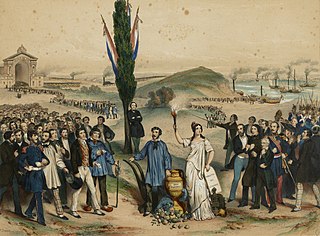
Suffrage, political franchise, or simply franchise, is the right to vote in public, political elections. In some languages, and occasionally in English, the right to vote is called active suffrage, as distinct from passive suffrage, which is the right to stand for election. The combination of active and passive suffrage is sometimes called full suffrage.

British Guiana was a British colony, part of the mainland British West Indies, which resides on the northern coast of South America. Since 1966 it has been known as the independent nation of Guyana.
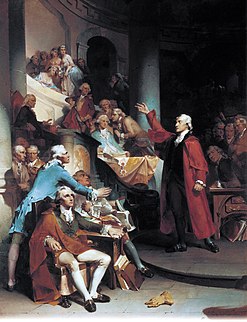
The House of Burgesses was the elected representative element of the Virginia General Assembly, the legislative body of the Colony of Virginia. With the creation of the House of Burgesses in 1642, the General Assembly, which had been established in 1619, became a bicameral institution.
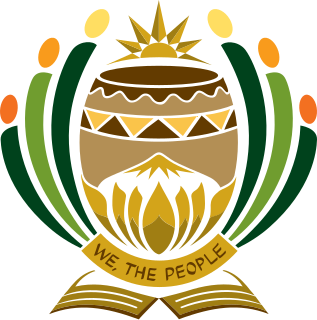
The Parliament of the Republic of South Africa is South Africa's legislature; under the present Constitution of South Africa, the bicameral Parliament comprises a National Assembly and a National Council of Provinces. The current twenty-seventh Parliament was first convened on 22 May 2019.
The governments of the Thirteen Colonies of British America developed in the 17th and 18th centuries under the influence of the British constitution. After the Thirteen Colonies had become the United States, the experience under colonial rule would inform and shape the new state constitutions and, ultimately, the United States Constitution.

The North Carolina General Assembly is the bicameral legislature of the State government of North Carolina. The legislature consists of two chambers: the Senate and the House of Representatives. The General Assembly meets in the North Carolina Legislative Building in Raleigh, North Carolina, United States.

The New South Wales Legislative Assembly is the lower of the two houses of the Parliament of New South Wales, an Australian state. The upper house is the New South Wales Legislative Council. Both the Assembly and Council sit at Parliament House in the state capital, Sydney. The Assembly is presided over by the Speaker of the Legislative Assembly.
The history of Georgia in the United States of America spans pre-Columbian time to the present-day U.S. state of Georgia. The area was inhabited by Native American tribes for thousands of years. A modest Spanish presence was established in the late 16th century, mostly centered on Catholic missions. The Spanish had largely withdrawn from the territory by the early 18th century, although they had settlements in nearby Florida. They had little influence historically in what would become Georgia.
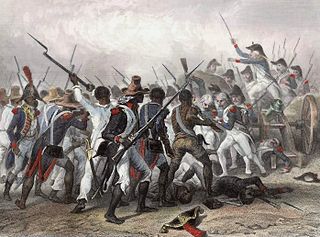
The Baptist War, also known as the Sam Sharp Rebellion, the Christmas Rebellion, the Christmas Uprising and the Great Jamaican Slave Revolt of 1831–32, was an eleven-day rebellion that started on 25 December 1831 and involved up to 60,000 of the 300,000 slaves in the Colony of Jamaica. The uprising was led by a black Baptist deacon, Samuel Sharpe, and waged largely by his followers.
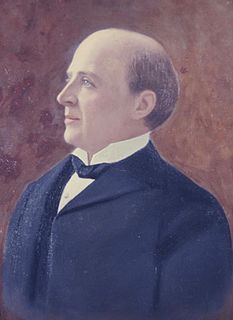
Edmond Favor Noel was an American attorney and politician who served as governor of Mississippi from 1908 to 1912. The son of an early planter family in Mississippi, he became a member of the Democratic Party.
Elections in South Africa are held for the National Assembly, provincial legislatures and municipal councils. Elections follow a five-year cycle, with national and provincial elections held simultaneously and municipal elections held two years later. The electoral system is based on party-list proportional representation, which means that parties are represented in proportion to their electoral support. For municipal councils there is a mixed-member system in which wards elect individual councillors alongside those named from party lists.

The Constitution of the Commonwealth of Virginia is the document that defines and limits the powers of the state government and the basic rights of the citizens of the Commonwealth of Virginia. Like all other state constitutions, it is supreme over Virginia's laws and acts of government, though it may be superseded by the United States Constitution and U.S. federal law as per the Supremacy Clause.

Women's suffrage – the right of women to vote – has been achieved at various times in countries throughout the world. In many nations, women's suffrage was granted before universal suffrage, so women and men from certain classes or races were still unable to vote. Some countries granted suffrage to both sexes at the same time. This timeline lists years when women's suffrage was enacted. Some countries are listed more than once, as the right was extended to more women according to age, land ownership, etc. In many cases, the first voting took place in a subsequent year.

Robert Smalls was an American politician, publisher, businessman, and maritime pilot. Born into slavery in Beaufort, South Carolina, he freed himself, his crew, and their families during the American Civil War by commandeering a Confederate transport ship, CSS Planter, in Charleston harbor, on May 13, 1862, and sailing it from Confederate-controlled waters of the harbor to the U.S. blockade that surrounded it. He then piloted the ship to the Union-controlled enclave in Beaufort–Port Royal–Hilton Head area, where it became a Union warship. His example and persuasion helped convince President Abraham Lincoln to accept African-American soldiers into the Union Army.
Black suffrage refers to black people's right to vote and has long been an issue in countries established under conditions of black minorities.

The Constitution of Guyana is the highest governing document in the Republic of Guyana. It came into effect on October 6, 1980, replacing the constitution enacted in 1966 upon its independence from the United Kingdom. The current Constitution of Guyana contains 12 chapters that are further divided into 232 articles. It also contains a preamble and an oath. Since its 1980 enactment, it has gone through multiple amendments.

Jamaica was an English colony from 1655, and a British colony from 1707 until 1962, when it became independent. Jamaica became a Crown colony in 1866.

The history of Tobago covers a period from the earliest human settlements on the island of Tobago in the Archaic period, through its current status as a part of the Republic of Trinidad and Tobago. Originally settled by indigenous people, the island was subject to Spanish slave raids in the sixteenth and early seventeenth century and colonisation attempts by the Dutch, British, French, and Courlanders beginning in 1628, though most colonies failed due to indigenous resistance. After 1763 Tobago was converted to a plantation economy by British settlers and enslaved Africans.
Free black people in Jamaica fell into two categories. Some secured their freedom officially, and lived within the slave communities of the Colony of Jamaica. Others ran away from slavery, and formed independent communities in the forested mountains of the interior. This latter group included the Jamaican Maroons, and subsequent fugitives from the sugar and coffee plantations of coastal Jamaica.














